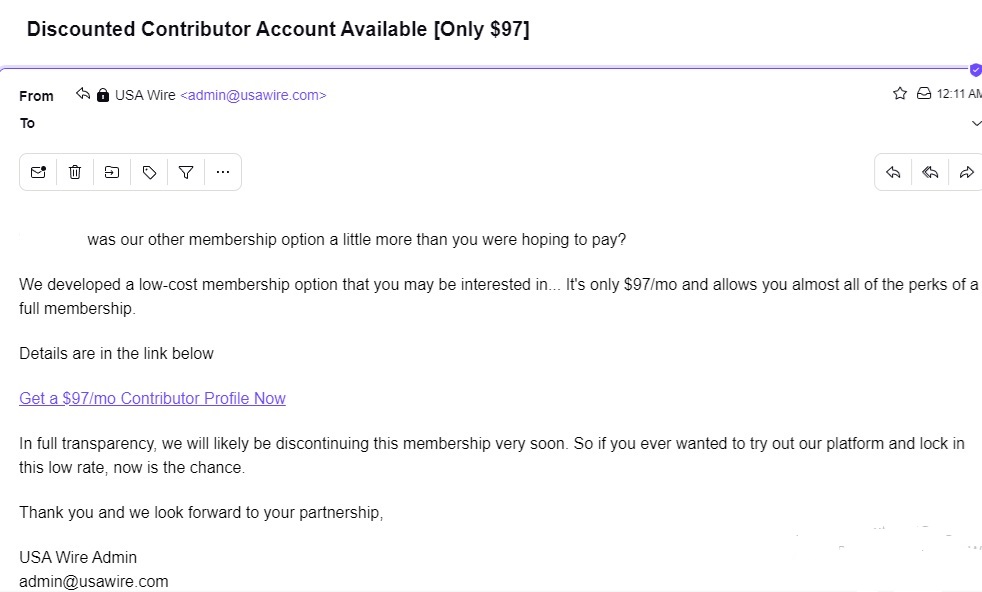In a move that has raised eyebrows and sparked outrage among writers and journalists, the online news publication USAWire (usawire.com) is asking authors to pay a monthly fee of $97 in exchange for the opportunity to contribute news, media and other content to its platform.
The unprecedented approach flips the traditional journalistic model on its head, where writers are typically compensated for their work rather than pay the other way around.

A Disturbing Trend in Journalism
In a media landscape where the importance of credible and well-researched journalism is more crucial than ever, the idea of writers paying to provide content for a publication is troubling.
Traditionally, newspapers and magazines invest in talented authors, offering payment for articles, features, and op-eds that engage readers and contribute to the public discourse.
The financial support fosters a vibrant media environment, allowing writers to focus on their craft while providing quality content for consumers.
Critics of USAWire’s model argue that it undermines the very foundation of journalism.
“Writers should be compensated for their expertise and the time they invest in crafting articles, not the other way around,” says Linda Martinez, a freelance journalist with over a decade of experience.
“This model not only devalues the profession but also threatens the quality of the content being produced. How can we expect meaningful journalism when writers are asked to pay cash to give a news site our own reporting?”
“The only time I would pay a news publication is to access its content (paywall) or if I were a PR agency looking to publish a client’s promotional media release,”
“Paying to become an author to contribute and provide a news platform my own journalism, research, and writing is simply unjustifiable,” Martinez said.
Impact on Content Quality and Credibility
The implications of such a model extend beyond compensation. Many experts worry that charging authors to contribute leads to a dilution of content quality.
When financial incentives are misaligned, the result is a flood of subpar articles, constructed by those more interested in exposure & SEO link building rather than delivering well-researched, thought-provoking pieces.
Moreover, the potential for biased or sensationalised content increases when writers are not adequately compensated.
“Publications that rely on unpaid or underpaid contributors often prioritise clickbait over journalistic integrity,” warns David Chen, a media analyst from Perth Australia.
“The trend can result in a race to the bottom where sensationalism trumps substance, ultimately eroding public trust in the media,”
“When I visit the site, I’m overwhelmed by the sheer number of low-quality, spammy articles cluttering the pages,” said Chen
“It’s frustrating to see hundreds of worthless and pointless articles that lack substance and relevance, filled with clickbait, hyperlinks and recycled AI content,” he said.
The Writer’s Dilemma
For many aspiring authors and journalists, the allure of a platform like USAWire may be tempting, especially for those struggling to gain traction in a competitive industry.
However, the price tag raises significant ethical questions. Should writers invest their limited financial resources in a platform that offers no guaranteed return on investment? Unless of course USAWire is operating as nothing more than a PBN blog. (private blog network)
“I can’t justify paying to write,” says Chen “If my work is valuable enough to be published, I should be paid for it instead on them asking me to hand over money to give them my own work, USAWire’s model feels exploitative, and it makes me question the integrity of the publication.”
A Call for Ethical Journalism
In 2024 it’s crucial for writers, editors, and consumers to advocate for ethical standards in journalism. The traditional model of paying writers for their contributions shouldn’t be undermined by profit-driven initiatives that prioritise revenue over quality content.
Misinformation spreads rapidly, the value of credible journalism has never been higher and online publications like USAWire must recognise the critical role that compensated writers play in maintaining the integrity and reliability of news.
As the debate unfolds, it serves as a stark reminder that journalism must prioritise the principles of fairness and accountability—not only for the sake of writers but for the public they serve.







